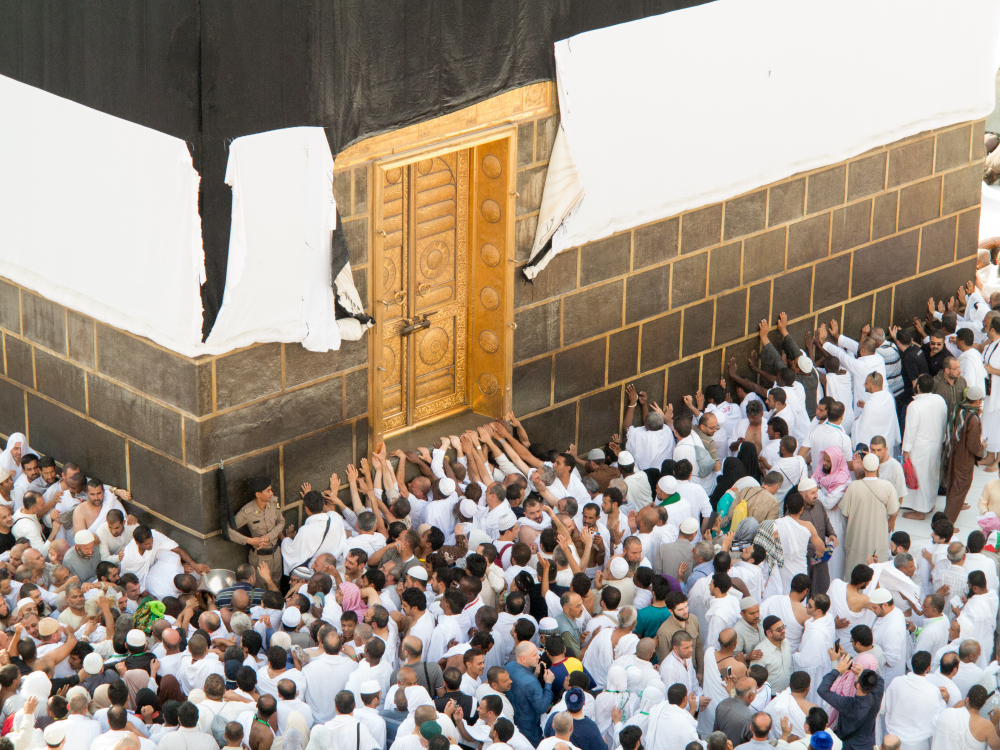Ihram ( إحرام) is not just physical attire but a state of spiritual purity and devotion required for performing the rites of Hajj and Umrah. Entering Ihram involves cleansing the body, declaring the intention, and wearing specific garments as you approach the Miqat.
Meaning of Ihram
Derived from the Arabic verb harama (حرم), which means “to be forbidden,” Ihram signifies a sacred state where certain lawful acts become forbidden for the pilgrims. This state is essential to perform the rituals of Hajj and Umrah.
Significance of Ihram
Ihram represents a state of purity, humility, and equality among all pilgrims, regardless of their background. It is intended to strip away distinctions of wealth and status, focusing the pilgrim’s attention solely on God.
When to Enter Ihram
- Before Miqat: Pilgrims must enter into Ihram before crossing the Miqat, a boundary around Makkah beyond which the sacred state must be assumed.
- From Home: According to the Hanafi school, it is meritorious to begin Ihram from one’s home, emphasizing the spiritual journey starts from your doorstep.
Entering Ihram
Preparation
- Perform the full ablution (ghusl) and ensure personal grooming is done beforehand, such as trimming nails and removing pubic and underarm hair.
Ihram for Men
- Wear two unstitched white cloths: the lower garment (izar) and the upper garment (rida).
- Ensure the right shoulder is exposed during the initial Tawaf.
Ihram for Women
- Wear simple, modest clothing that covers the body except for the face and hands. The clothing should not be form-fitting or see-through.
Salah al-Ihram (Prayer Before Ihram)
- It is Sunnah to perform two rak’ahs of voluntary prayer before making the intention for Ihram, ideally at the Miqat or just before.
Niyyah (Intention for Ihram)
The intention must be declared clearly and can be made in the heart and voiced:
- Umrah: لَبَّيْكَ اللَّهُمَّ عُمْرَةً (Labbayka Allahumma ‘Umrah) – “O Allah, here I am for Umrah.”
- Hajj: لَبَّيْكَ اللَّهُمَّ حَجًّا (Labbayka Allahumma Hajjan) – “O Allah, here I am for Hajj.”
Talbiyah (Recitation upon Intention)
- Pronounced continuously after making the Niyyah and until the start of the Tawaf, the Talbiyah signifies the pilgrim’s response to Allah’s call.
- Men recite loudly, women quietly.
Conditions of Ihram
Permissible Actions
- Bathing, changing Ihram garments, using unscented soap, and carrying necessities.
Disliked Actions
- Combing hair or scratching in a way that hair might fall out.
Forbidden Actions
- Cutting hair, covering the head (for men), wearing stitched clothing (for men), applying perfume, and engaging in marital relations.
Penalties for Violations
- Minor Violations: Might require Sadaqah (charity).
- Major Violations: Could necessitate sacrificing an animal or fasting.


